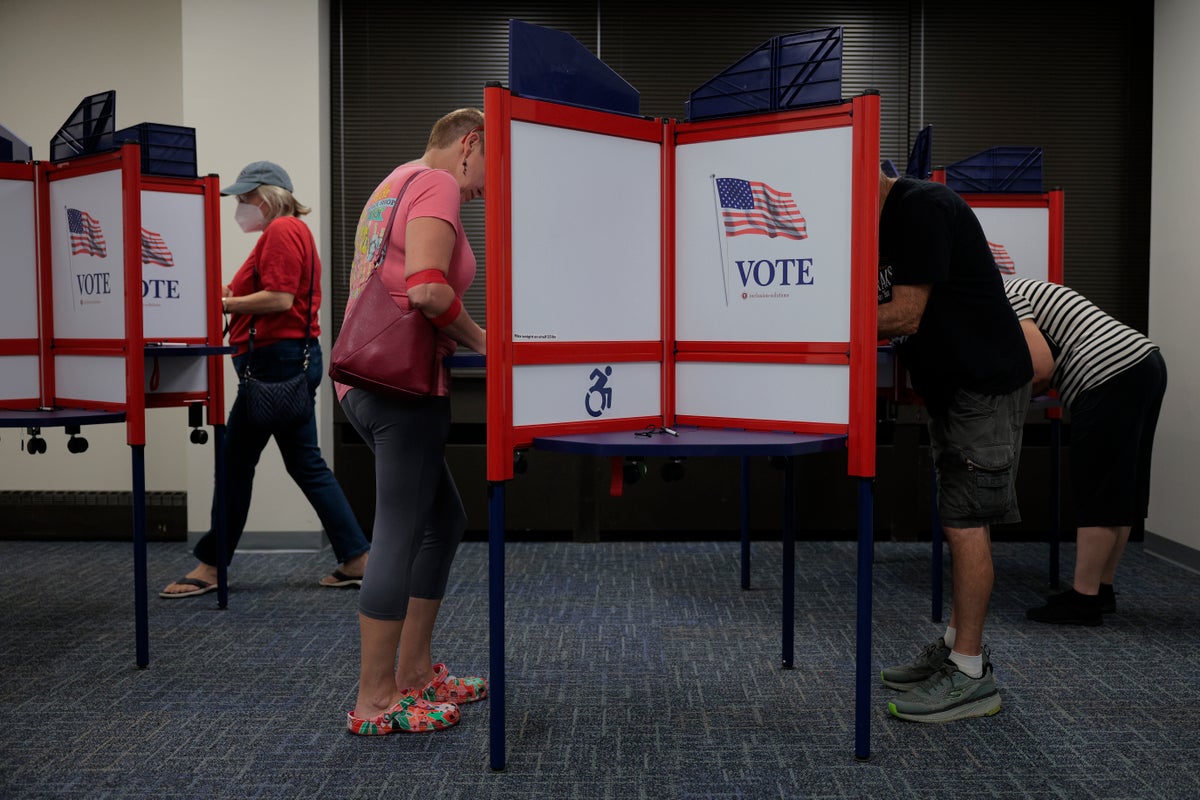
The Department of Justice is suing eight states in a brewing war for control of sensitive voter registration data ahead of midterm elections in 2026 that could determine the balance of power in Congress and chart the course for Donald Trump’s final months in office.
The lawsuits — escalating the Trump administration’s efforts to collect voter data, including addresses, driver’s license numbers and partial Social Security numbers — accuse states of illegally blocking the Justice Department’s efforts to scrutinize voter information as part of a wide-ranging effort targeting Democratic-led states.
Since Trump entered office, the DOJ’s Civil Rights Division — led by Trump ally Harmeet Dhillon — has requested voter registration information to at least 24 states, including requesting a complete list of all registered voters from at least 22 states.
California, Michigan, Minnesota, New York, New Hampshire and Pennsylvania were sued Thursday after the Justice Department launched lawsuits in Oregon and Maine last week.
Voting rights groups and voters in Oregon and Maine have since countersued or intervened to try to stop DOJ’s legal blitz, calling the lawsuits “radical” overreach.
“Clean voter rolls are the foundation of free and fair elections,” Attorney General Pam Bondi said in a statement. “Every state has a responsibility to ensure that voter registration records are accurate, accessible, and secure — states that don’t fulfill that obligation will see this Department of Justice in court.”
But “not at any single point have we been given clarity how this information will be used,” Michigan Secretary of State Jocelyn Benson told reporters this week.
“Given that this isn’t normal and extremely alarming, they have not been upfront … about what they plan to do with this information,” she said. “We can surmise the ways in which this can be used or misused to harass, intimidate or remove eligible voters from the rolls … Or create this aura that states are unable to do what is our duty, which is to maintain accuracy of voter rolls.”
Without those assurances, “we’re not going to simply turn over to a government that won’t tell us how they’ll use it,” she said.
California Secretary of State Shirley Weber called the lawsuits “a fishing expedition and pretext for partisan policy objectives.”
“State law is clear — California has a legal obligation to protect our voters’ sensitive private information,” she said in a statement. “The sensitive data of California citizens should not be used as a political tool to undermine the public trust and integrity of elections.”
California Sen. Alex Padilla said in a statement that the Trump administration “will stop at nothing to rig future elections in a desperate effort to cling to power.”
“Now he’s weaponizing the Department of Justice in a clear attempt to purge eligible citizens from voter rolls in California and other states across the country,” he added.
Earlier this month, Reuters reported that the Justice Department is discussing transferring sensitive voter roll data for use in criminal and immigration-related investigations at the Department of Homeland Security.
Trump and his allies continue to baselessly insist that the 2020 presidential election was stolen from him, including amplifying false claims about safeguards in place to prevent ballots cast by noncitizens.
A false claim that millions of noncitizens are voting in federal elections is also fueling legislation in Congress that could upend how Americans register to vote.
The Safeguard American Voter Eligibility Act, or SAVE Act, would require a passport or a birth certificate matching one’s current legal name when registering to vote and sets onerous in-person requirements that would make it more difficult to participate in elections.
The president has separately signed an executive order that similarly requires proof of citizenship when registering to vote. It also would require a national mail-in ballot deadline of Election Day.
Noncitizen voting is already illegal and exceedingly rare, and there is no evidence that widespread election fraud has changed election outcomes. Democratic officials and voting rights advocates fear the Trump administration is setting the stage for challenges to election results by building a spurious body of evidence to undermine the outcomes.
“If you’re going to risk the livelihood of your family, livelihood from your job, to participate in an election, I don’t think that’s a priority for anyone here in the United States,” Nevada Secretary of State Cisco Aguilar told reporters this week. “It doesn’t make sense. It’s illogical.”
The legal battle over election administration dovetails with a Trump-led gerrymandering arms race to redraw congressional districts to give GOP candidates an edge in midterm elections. Early polling shows Democratic candidates narrowly edging out Republicans on a generic ballot.
Trump, meanwhile, is pushing federal and state officials to “get rid” of mail-in ballots before next year’s midterms, a move that could disenfranchise thousands of people who rely on voting by mail.
On his Truth Social account last month, Trump promised to “lead a movement” and sign an executive order that he claims would target the “completely disproven Mail-In SCAM,” despite the president himself casting mail-in ballots in previous elections and encouraging Republicans to vote by mail in 2024.
Nearly one-third of all ballots cast in 2024 elections were submitted by mail, according to the U.S. Election Assistance Commission.
